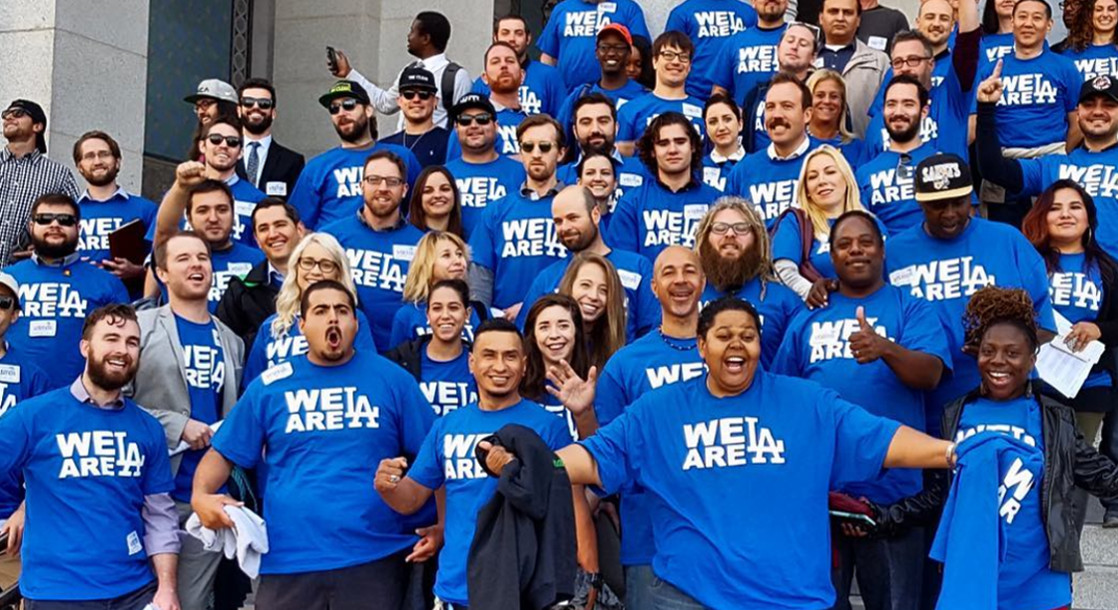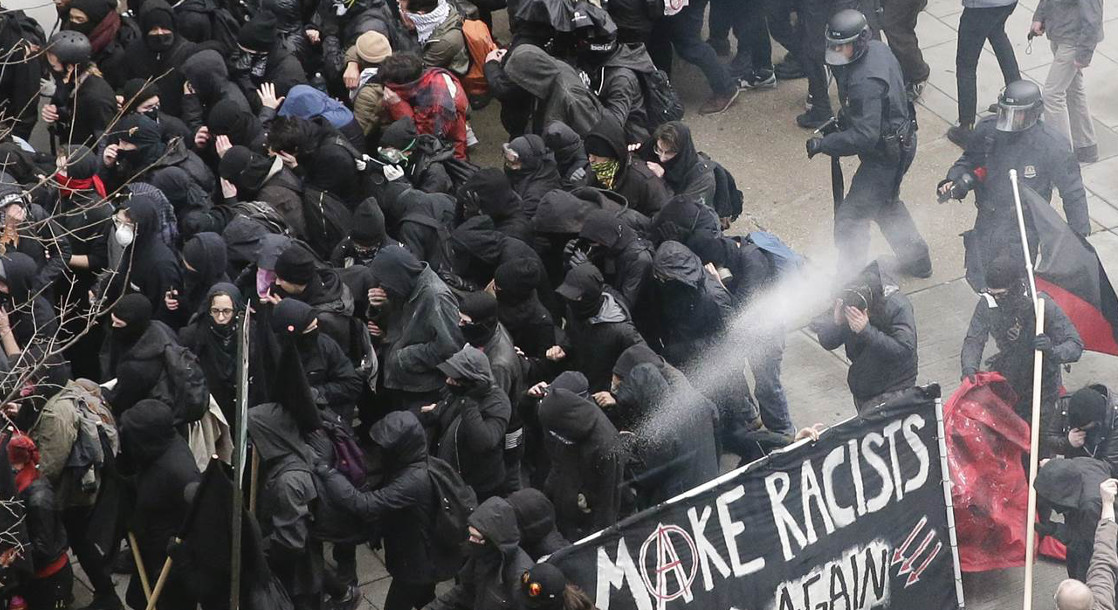Photo via California Minority Alliance; founders Donnie Anderson & Virgil Grant, front center-left
In 2008, L.A.-based entrepreneur Virgil Grant was arrested by the U.S. Drug Enforcement Agency (DEA) for conspiracy, money laundering, and operating a drug-related business within 1,000 feet of a school. At the time, he owned six licensed medical cannabis dispensaries under the California Cannabis brand. In 2010, he would become the state’s first licensed dispensary owner to be sentenced by the feds.
Virgil Grant is also African-American, and his conviction reflects a more pervasive problem plaguing the nation’s marijuana policies.
While Grant stewed in prison for four years, California’s medical marijuana sales skyrocketed. Between 2010 and 2015, legal weed sales in the Golden State more than doubled, jumping from $350 million to $814 million. When he emerged from incarceration, he carried a criminal record around with him while a white-dominated weed industry banked toward the billion-dollar mark.
But Grant will have the last laugh, if making amends for over a half-century of wrongs could be considered humorous.
Legalization’s Overdue Promise
Two years after his release from prison, Grant joined forces with Donnie Anderson and founded the California Minority Alliance (CMA), a non-profit dedicated to unifying, educating and empowering minority-owned cannabis businesses. With Proposition 64 on the table, they knew they could bring something to legalization that hadn’t been done before, and their goal was to bring true social equity to the new legal landscape.
“We are the process of social equity,” Anderson told MERRY JANE over the phone. “When they created this War on Drugs, it was targeted toward people of color. That’s why we created the social equity program.”
So far, several cities in California are either rolling out or are about to implement social equity programs. Although the details differ between municipalities, the general idea is the same: a tiered system which prioritizes cannabis licensing to business owners residing in neighborhoods hit hardest by the War on Drugs. Aspiring entrepreneurs with prior cannabis convictions and who meet residency requirements are Tier 1, where they sit at the front of the queue for license consideration.
Furthermore, social equity programs may do more for licensees beyond granting business permits. City offices can assist licensees with obtaining loans, finding start-up capital, or securing business space under incubators — business owners who may participate in the program if they pay the rent for an equity recipient.
There’s more. Businesses that receive social equity licenses must reinvest in their communities, namely by hiring employees who live within a short radius of a given dispensary’s location. This ensures that outsiders and Big Money can’t muscle their way into these neighborhoods, and that any profits, skills, or experiences gained in these communities stays local.
Marcy Lyles and Walter Edwards are two social equity applicants based in the Los Angeles area. Lyles has worked as a hairstylist and cosmetologist for 30 years. Edwards has a background in construction. Both decided to switch to the cannabis industry to bring economic renewal to their neighborhoods, ones that have experienced dismal unemployment and sky-high crime rates for decades.
“We are productive, and we will be productive,” Edwards says regarding his community in South Central. “But we’ve been dumped on with everything from drugs to guns to cocaine, so we’ve never been given a chance to flourish. And of course, we can make choices, but when there are no jobs here, the choices have been taken away. This program says, ‘Hey, we’ll give you that chance. Let’s go.’”
Lyles notes that the social equity licenses haven’t yet been awarded in L.A. Before receiving the license, business owners must first secure a place of business, then present a business plan to the city — a time-consuming but necessary process.
“[The city] is giving those people that want to get into the industry an opportunity and a fair chance — even a little head start — so that we can get businesses up and running,” she says. “It’s going to be a slow process, but it’s going to be a sure process.”
Supernova Over Oakland
While Anderson, Grant, and the California Minority Alliance are working on social equity in Los Angeles, a group of women did the same in Oakland, the first city to begin dispensing social equity licenses. Supernova Women, founded by Tsion “Sunshine” Lencho, Nina Parks, Andrea Unsworth, and Amber Senter in 2015, offers free workshops and other educational events for power minorities — especially women of color — looking to break into the cannabis industry.
Currently, two of Supernova’s founders have applied for social equity licenses. Senter recently won hers from the Oakland lottery. Parks and her brother, Malcolm Mirage, are in line to receive theirs in San Francisco sometime soon.
Parks and Mirage spent most of their time advocating in San Francisco, while the rest of the Supernova Women team handled Oakland. That meant attending meetings — a lot of meetings.
“Often, people of color are talked about at these meetings for legalization, but not many people of color are at the table,” Parks says. “They’ll say, ‘The War on Drugs devastated communities of color!’ Then you’ll look around the table, no color.”
Initially, Parks and Mirage met some opposition to social equity in San Francisco, with people claiming the program blocked established cannabis business owners from entering the local market. But that opposition was short-lived.
“They couldn’t fight the fact that the data bears out, even in San Francisco. People of color were six to twelve more times more likely to be convicted of a cannabis offense from 1970 to 2016,” says Mirage. “They didn’t want to be on the wrong side of that argument.”
Greg Minor, the assistant to the City Administrator of Oakland, handles the social equity licenses there. He also told MERRY JANE that initial resistance to social equity came, ironically enough, from portions of the cannabis industry itself. However he notes other industry players and members of city council fully backed the idea.
“It’s been exciting to see how that’s developing,” Minor says. “We’re getting calls from people across the state and the country. It’ll be interesting to see how others improve upon our model and apply it to their own communities. We’re trying to be mindful by receiving feedback and adapting over time.”
The Sparks Beneath Ignition
The CMA and Supernova Women’s efforts have caught the attentions of not only other cities in California, but other states, as well. Anderson says Carson, Stockton, Santa Ana, San Bernardino, and Commerce are jumping on board with social equity programs for cannabis businesses. Outside of California, New Jersey; Atlanta, Georgia; Arkansas; Boston, Massachusetts; Washington, D.C. and Baltimore, Maryland are also looking into launching social equity programs based on the Los Angeles/Oakland models.
When I told Anderson that Colorado, my state of residence and the first to go legal, wasn’t even discussing social equity at the moment, he replied, “Of course they aren’t.”
Pushing for social equity wasn’t easy, says Parks and Mirage, but they insist it’s much easier than one may think. All it takes, they’ll tell you, is to get out there and be heard.
“One, start to build within your community,” notes Parks. “Talk to people who have restorative justice mind states, like civil rights attorneys; people who can frame the conversation in a way your legal representatives can understand it.”
“Two,” Parks continues, “come with your truth. Come with your experience. This is the reality of where America is. This is the reality of where communities are. We shouldn’t have to be silent.”
“The key for individuals that want to begin equity programs is to go to those public comment meetings,” adds Mirage. “You got to go to every single meeting and make your comment, have your spiel, and do it over and over and over again. That’s the only way your public representatives are going to get to know your story. You’ll find allies. That’s really how it grew for us.”
Tabula Rasa
Prioritizing licenses for former cannabis convicts isn’t enough, however. To truly level the playing field in the cannabis industry and for social justice in general, criminal records need to be dealt with, too. After all, if weed is legal now, we are collectively acknowledging that weed was never a bad thing to begin with. Past criminal convictions shouldn’t haunt freed men and women today.
Fortunately, Proposition 64 already tackled that issue. Written into the law is a section that allows any California resident with a prior cannabis conviction to apply for either reducing the form of conviction (felony to misdemeanor) or having their records expunged altogether. There are almost no precedents for this in American history; we’re the only Western nation that does not observe legal amelioration.
The onus for expungement falls on those with the records. The downside is many Californians are completely unaware that they now have this right under Prop 64. Additionally, applying for expungement or reduction can be a time-consuming and costly process, wrought with headaches for those who’ve already been run through a callous and cruel penal system.
Assemblymember Rob Bonta (D-Oakland) intends to change that. In his eyes, cannabis convicts shouldn’t have to take on the burden of clearing their records. Instead, he believes since the state unjustly incarcerated these individuals, the state should bear responsibility of correcting their records.
“There’s a fee for requesting criminal records, a fee to file paperwork with the court,” Bonta explained to MERRY JANE by phone. “There’s the time it takes off of work or from family to seek this relief in court. You might have to go to court multiple times, and you might even have to hire an attorney if the D.A. challenges your request. All of that was just way too burdensome.”
To remedy the situation, Bonta introduced Assembly Bill 1793 to the legislature last month. The bill does not grant any new rights or privileges to Californians with cannabis convictions. Rather, it shifts the process of reducing or expunging cannabis charges entirely onto the state, with state officials informing each resident of the changes by mail once completed.
“Government is supposed to provide rights to individuals, not create bureaucratic barriers and obstacles that prevent individuals from enjoying those rights,” Bonta says.
Other states may take Bonta’s cue and implement their own expungement programs after seeing how California’s pans out. If AB 1793 gains the same momentum as the state’s social equity programs, we may be seeing that across canna-legal states much sooner rather than later.
And it’s about fucking time. Social restoration for convictions related to a non-toxic, medicinally beneficial plant has been way, way long overdue.
“California’s had twenty years of industry. We’re not new. It’s an evolution of our industry,” says Parks. “We’re fighting tooth-and-nail, that’s why these programs exist. There still needs to be a pathway to help the people who created it."











